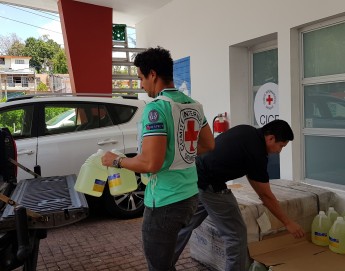
Protection, dignity, and respect for deceased individuals and their families in COVID-19
When people die during war, disaster or migration, their bodies must be handled respectfully and with dignity. The remains of individuals must be found, recovered and identified to help prevent and resolve the tragedy of people unaccounted for as a result of armed conflict and other situations of armed violence. Humanitarian work has come to include these tasks, and forensic science offers the necessary tools and expertise. Through its team of forensic specialists, the ICRC works globally to help guarantee the dignified management of the dead and uphold the right of bereaved families to know what happened to their loved ones.
In the current COVID-19 pandemic, the ICRC is adapting its existing activities and programs to ensure we can help address the growing needs globally concerning the dead, their families, and those working to manage the dead.
Recommendations for authorities and forensic institutions
The ICRC has developed guidance with recommendations for authorities and forensic institutions for the dignified management of the dead during COVID-19. These recommendations include:
- The health and safety of all those directly involved in the management of the dead is a priority and they should be provided with the appropriate personal protective equipment (PPE).
- All measures taken, including policies, regulations and practice must demonstrate respect towards the deceased individuals and their families, and of affected communities.
- A preparedness plan needs to ensure the capacity to deal with any surge in fatalities alongside expected caseloads, including the welfare of staff and affected communities. Planning should include (1) possibility for families to bid farewell to dying loved ones, (2) family liaison structure to respectfully inform of the death of a loved one; information points for families to turn to for support, (3) provision of documentation of death needed for estate matters and other financial obligations, and (4) dignified treatment of remains and (temporary) burial in a culturally-appropriate manner and according to wishes of the deceased – if expressed beforehand – and the family
- Every effort should be made to ensure the timely and reliable identification, documentation and traceability of the dead.
- All bodies, including the unidentified and unclaimed, stored in temporary facilities or buried must be tracked and be accounted for.
- Concerned authorities should ensure they have the physical structures needed for storage of bodies, enough burial space and perform burials or cremations according to cultural and religious needs.
- Consultation should be held with relevant stakeholders, such as religious representatives and community leaders, for ensuring that changes to standard practices required for health and safety reasons are understood and followed.
Preventive measures should be specially adopted in detention facilities, refugee camps, and large city slums, including dispelling myths and ensuring preparedness to deal with a higher than normal number of deaths than current capacity can handle.
Additional resources for health care and death care workers
- Posters: Basic Measures for healthcare and deathcare workers in the handling of the dead (English, Spanish, Arabic, French, Russian)
- Posters: Basic measures for healthcare and deathcare workers in the handling of the dead for Islamic burials (English, French, Arabic)
- Video: Basic Measures for healthcare and deathcare workers in the handling of the dead (English)
- Video: Q&A with ICRC Legal Adviser on COVID-19 and Islamic burials (Arabic) (English)
- Document: ICRC COVID-19 General guidance for the management of the dead (English, French, Spanish, Arabic, Russian)
- Document: Safe body handling and mourning ceremonies for COVID-19 affected communities: Implementation guidance for National Red Cross and Red Crescent Societies
- Document: COVID-19 Inter-agency guidance for the management of the dead in humanitarian settings
- Document: Cemetery management during COVID-19
- Document: Buddhist Management of the Dead and COVID-19 (English)
- Document: Management of the Dead Under Islamic Law
- Article: Hinduism and Management of the Dead
- Forensic Science International: Synergy paper: ICRC General guidance for the management of the dead related to COVID-19 (English)
The ICRC encourages authorities and forensic institutions to incorporate these recommendations and resources into their work practices as a part of their COVID-19 planning and response. Many funeral homes and morgues have been quickly overwhelmed by mass casualties from COVID-19 already. The ICRC aims to assist authorities and forensic institutions to prevent overwhelming of local capacity and to uphold the right of bereaved families during this difficult time.





